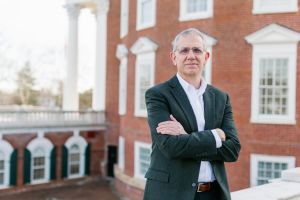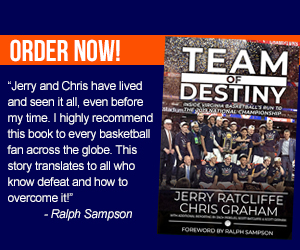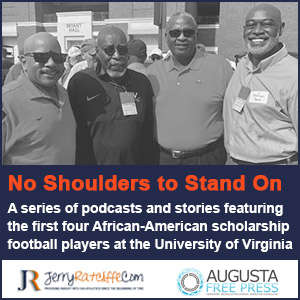‘Basketball Whisperer’ Perrin Helps Diakite And Huff’s Confidence Soar

By Jerry Ratcliffe
LOUISVILLE — Chances are that if you are well-read or a movie buff, then you’re probably familiar with “The Horse Whisperer.”
The novel by Nicholas Evans, and the film by Robert Redford, portrays a legendary horse trainer with a remarkable gift for understanding horses. His voice could calm wild horses and his touch could heal broken spirits.
What if we told you there’s the equivalent to that trainer in the world of college basketball and he’s working with Virginia’s Cavaliers?

Dr. Tom Perrin
Meet Dr. Tom Perrin, a former basketball coach for Terry Holland and Jeff Jones, a man familiar with UVA’s golden age of hoops. A Charlottesville resident for more than three decades, Perrin turned his attention to sports psychology and business consultation and has worked with the United States national and Olympic soccer teams, NBA organizations, and with the business world.
One of his stints in recent years has consisted of helping various Virginia basketball players reach their potential through his confidence-building enforcement. Let’s call him “The Basketball Whisperer.”
Perrin has worked with Malcolm Brogdon, Anthony Gill, and others from that recent era. A year ago, Tony Bennett asked Perrin to spend some time with De’Andre Hunter and Jay Huff because they were coming off a redshirt year and would be contributing to the team.
Here were two guys that had sat out a year and were about to be integrated into a successful team. Later in that season, Mamadi Diakite, who was already playing, but still attempting to gain a better understanding of the sport, was added to Perrin’s mix.
Diakite’s and Huff’s progress on the court as this season has progressed has been obvious to Cavalier fans. Part of that improvement has come through practice and coaching from the Virginia staff. Some of it could be attributed to strength and conditioning. The mental part is all Perrin.
Both players’ confidence has soared over the latter half of this season and Bennett praised Perrin’s ability to draw out the best of the two big men.
“I think there’s such a development with players on the mental side of the game,” Bennett said Wednesday. “Sometimes just processing things with others outside has been good.
“Tom has been great with them,” Bennett continued. “When guys aren’t playing 35 minutes, 30 minutes a game, and sometimes they’re coming off the bench and it’s hit or miss. You have to be strong-minded to be successful in that and be in the moment … what you know, how to process success and failure because you’re in a limited window.”
Diakite’s minutes have increased since late January and reached highs of 31 minutes in wins over Miami and Virginia Tech. His shot-blocking ability as a rim protector, his skill in attacking the rim offensively, and improvement as a defensive player have made him a more dependable piece.
Huff’s minutes began hitting double digits early in the ACC portion of the schedule as he enjoyed a four-game stretch of 17 to 18 minutes in wins at Louisville and Syracuse, in addition to home games against Georgia Tech and Pittsburgh.
Both players are likely to play important roles in tonight’s Sweet Sixteen game against Oregon, and going forward should UVA advance.
The good news is that Huff, a 7-foot-1, 232-pound redshirt sophomore from Durham, N.C., and Diakite, a 6-9, 228, redshirt junior from Guinea, will return next year.
Both players pointed out that their sessions with Perrin have helped them tremendously. More on that, later.
Bennett is most appreciative of what the “Whisperer” has accomplished in an ongoing relationship with Cavalier players.
“I think Tom has helped those guys and those guys have helped themselves by how they’ve just stayed after it,” Bennett said. “They’ve been about the team and they’ve worked. And that’s a pretty consistent formula for players that are good.”
Diakite has improved to the point where he has earned 18 starts in UVA’s 34 games. Huff isn’t quite there, but has contributed big-time in several games down the home stretch. He is a unique seven-footer in that he can shoot 3-pointers with accuracy, drive and dunk, swat shots, and has become a more reliable defender in Bennett’s complicated “Pack-Line” defense.
Perrin prefaces his role by noting that he doesn’t get to spend large amounts of time with the players. His sessions, which are held sometimes in an empty practice gym at John Paul Jones Arena, are following practice. It’s not like a fireside chat.
Players have to watch film, eat, move on. Time is of the essence. He can also keep in touch with a simple phone call or text exchange if he’s out of town on business or they’re out of town for games.
“I’ve probably met with these guys 20 or 30 times this season going all the way back to September to present,” Perrin said. “These are not idle kids, so you have to get to the point pretty quickly.”
Perrin, although he has a basketball background from 18 years of coaching (15 at UVA), he is not coaching Diakite or Huff in basketball. That’s Bennett and his staff’s job. Perrin’s dealings with the players is about the way they have to think and feel, what they have to do in order to be successful and effective.
“The real gist is to start off by establishing a very clear picture of how these players, individually, have to approach what they’re doing, and over time to work and refine in making it better and holding them accountable,” Perrin said.
How do they carry themselves consistently in practice and in games?
“My goal is to not have them being responsible to me,” Perrin said. “My goal is to have them be responsible to themselves.
“Once we’ve established how Mamadi needs to approach his game, what he needs to bring to that in terms of attitude, energy, mindset … and the same with Jay. It’s all about, are they being responsible to that or not. If they are, how can we make it better? And, if not, why not, and how to get back to it.”
Certainly there have been some rough spots in the road. One of Diakite’s biggest drawbacks has been inconsistency. Because basketball was relatively new to him when he began his career, everyone was waiting on his hoops IQ to catch up to his off-the-chart athleticism.
“Mamadi and I have had some pretty direct conversations,” Perrin said. “I talked to Mamadi the day before the team left for Columbia (first and second round of the NCAA tournament). We had a hard conversation right after the Florida State loss (in the ACC tournament semifinals in which Diakite played only 13 minutes, was pulled early and never returned).
“I asked him, ‘Where were you on Friday night against Florida State?’” Perrin said. “It was pretty direct.”
The good part is that both players respond and correct the shortcomings immediately.
“My goal is to get them to be more responsible to themselves and what they need to do to be successful, to get what they want. It’s not to be responsible to Tom. They have to be responsible to themselves, to their teammates and coaches.”
Diakite was in a bad place that night against FSU, a physical and aggressive team. He was roughed up and didn’t answer the bell. Bennett had no choice but to replace him for the rest of the game.
True to form, as Perrin said, Diakite came back strong in the NCAAs, putting up 17 points and nine rebounds in 26 minutes against Gardner-Webb, then added 14 points, nine boards and a block against Oklahoma in 28 minutes. He stayed out of foul trouble in both games.
“Tom has helped me through a lot of ups and downs,” Diakite said. “Everytime something is not going right for me, I’ll call him or he texts me to see if I want to meet.
“Last Wednesday before Columbia, we had a session,” Diakite said. “We talked and he told me how much energy I have to bring. I don’t have to be too high. A ‘10’ is too high (on a 1-to-10 scale). That’s way too much energy. I can feel very loose and focused at about six. I need to be somewhere around a seven-and-a-half to eight for a big game.”
Perrin recognized Diakite’s emotional approach to games immediately and addressed that over time, and it has helped.
“We all know Mamadi is full of life. He brings energy every night,” Perrin said. “Even though it is fairly natural for him to do that, there’s a conscious part of it that he has to address. Mamadi gets very excited. Too high, too up.
“I’ve explained him to make sure he finds the right point of readiness that’s optimal for him so that he’s not so amped up that he’s sort of going through the roof. You’re not going to find Mamadi flat. The challenge is that he’s not too up.”
That was part of the early analysis when Diakite and Huff were coming into the season playing lesser roles. Huff had played very little. Diakite had played, but had a lesser role on a team with so many players returning. They were trying to figure out where they fit in.
That was Perrin’s role, to help them get there. If they just sat back and simply reacted to their experience, they might not have gotten better. The key for Perrin was how to advance them to the point where they could assert themselves and be confident enough to experiment and to be willing to succeed and fail along the way.
“When you think of people who aren’t used to an out-front role, and haven’t been a major factor, there’s a lot of work to get to that,” Perrin said. “It has taken the better part of the season to get there.
“You can see it now in Jay. He’s not the same Jay as December. The other night he squared up to get a shot, then went by his guy and dunked the ball. He wouldn’t even have tried that in December. He probably would have passed.”
Before all this confidence began to build, Perrin had to figure out who these guys were. He recognized immediately that both desperately wanted to be good and have worked hard to get there.
For instance, Perrin learned that Huff does not compartmentalize basketball in his life. For Huff, basketball is inside of a larger frame that includes his family, faith, his relationships outside of basketball.
“If one doesn’t get that about Jay, you’re kind of missing Jay,” Perrin said. “Basketball for these guys inside their larger life has to be considered and included in the conversation. I never meet with them without checking on how it’s going for them. It’s never just about basketball. It’s first about the larger experience of what’s going on, and then basketball.”
Diakite is a little different. Basketball plays a huge role and he has the ability to come to the basketball experience without being affected by other things. That’s part of what makes him Mamadi. There’s no value attached to it, good, bad, right or wrong.
Perrin has to find out what works for each. There are very real patterns in all our lives and the question is what works and how do we each stay with that within the pushes, pulls, and tugs of life challenging us.
“We can watch games and see that Mamadi and Jay are good. The question is how did they get there and how do they stay? What’s going to get in the way with that? That’s what successful people do and what everybody is trying to do,” Perrin said.
The fact that Perrin coached and understands basketball has helped him in dealing with athletes, particularly basketball players. He’s been working with college athletes for 35 years. He can relate to what their lives are like, what they’re going through. There’s an immediate connection, no pause, because he speaks their language.
“The real art of this is to find the answers in them,” he said. “Certainly, from techniques I can find things that work for them, and draw out of them what’s the best. This is really about helping them be who they are fully and completely. They have to do that. I can’t do that for them.”
He’s basically putting a stake in the ground, pointing out that this is the way you need to be. Did you do it? If you didn’t do it, why didn’t you do it? It’s a very frank approach.
That is something both Huff and Diakite have appreciated from the start.
“Tom is really good about talking through different situations throughout the season,” Huff said. “He likes to check in and see what parts of my life are going well. He figured out pretty early on that I’m not just a basketball player.
“I have my family, friends, all that going on. If I haven’t seen them in a while, and if there’s something going on there that’s stressful and if it’s showing on the court, he’s pretty good about pointing that out and figuring out that sort of thing,” Huff continued.
The seven-footer said there definitely has been stretches where he wasn’t playing as much and Perrin helped him navigate through those times. He also gets texts before games from Perrin.
“Tom has helped quite a bit,” Huff said. “Just whenever he’s around we talk a little bit, sometimes longer than others. Usually he’s just checking in. I like that way of doing it. He wants to see how I’m doing, after a game if it was good or if it was bad, it’s not like, ‘Yeah, that was great.’ He’s not too high or low when we talk.”
Huff also likes the approach that Perrin uses as a sports psychologist.
“It doesn’t feel like you’re sitting down in a psychiatrist’s office with someone asking, ‘How does that make you feel?’” Huff chuckled.
The low point of the season for Huff was during the non-conference portion of the schedule. He wasn’t getting as much time. Part of the problem was his defense wasn’t quite where Bennett wanted it and the coach brought him along, slowly but surely.
It probably didn’t help that Huff is a huge fan favorite with Wahoos clamoring for the big man to get more time. They love watching him shoot 3’s, slam dunking the ball and swatting away opponents’ shots.
“That was a little bit harder during that time but Tom was there to talk me through it,” Huff said.
Now that he’s had more success, Perrin texts him before games.
“He’s telling me, ‘You’ve got to bring this and this [to the table].’ Even if I have a bad game, it’s not like he’s reacting as if I was terrible. It’s just, ‘stuff to work on,’ that sort of thing.”
Diakite said he remembers exactly when Perrin stepped in to help him and he took to Perrin immediately. He liked his nice-guy approach and the way Perrin wanted to form a relationship.
“I was going downhill at the time,” Diakite said. “I wasn’t in a good state mentally. I don’t mean I had mental problems (he chuckled). I was asking myself many questions and I had anxiety. I didn’t know how to control myself.
“I didn’t know if I was going to play more or what I was supposed to do to play more. I felt there was a lot of pressure on me and I didn’t know what to do. So [Bennett] recommended Tom to me.”
Diakite remembers his lowest point to.
“I got to a point where I felt, wow, I don’t know what to do. I didn’t think I was having a good season and I was feeling not motivated,” Diakite said. “Tom put more motivation in me to wake up. It was a wake up call for me. Everytime I don’t feel right, I let him know and he gets me right.”
Diakite said his confidence has never been this high in his entire young life and he attributes that directly to working with Perrin.
“I’m thanking him for that,” Diakite said. “He has helped me tremendously. Good game, bad game, I talk to Tom. He’s been telling me what I have to bring, how I have to show Coach Bennett that I’m ready to battle and help the team to hopefully win an NCAA championship.”
When Diakite got the start against Oklahoma in the team’s last outing, Bennett debated whether or not to go with the former Blue Ridge School player or to stick with a less-mobile Jack Salt against the more mobile Sooners. He settled on Diakite but challenged him to remain focused, and Diakite answered.
Perrin said he’s doing with those two what successful people are trying to do.
“They’re trying to figure it out,” Perrin said. “Not everybody is LeBron James, good every night. There’s a lot of moving parts every day for these two players. They have to be able to respond in the moment.
“This doesn’t have to be basketball or athletics. It could be manufacturing. It relates to all of us. Much of the world of work out there is intense, fast-paced and people have to deliver. People are trying to figure out ‘who am I,’ and ‘how do I have to conduct myself to be successful. I can’t be somebody else. I’m not LeBron James. I’m me.’”
Perrin has made a large, but quiet impact on Virginia’s basketball success from Brogdon to Hunter to Diakite to Huff, and to future players as well.
He realizes he’s just part of the big picture in helping Virginia’s program rise to new heights, or at least resurrected heights.
“Tony and his staff and the teammates are the real motor,” Perrin said. “There’s just a role that I play in all of this.”
The Basketball Whisperer, quietly makes a loud difference.














